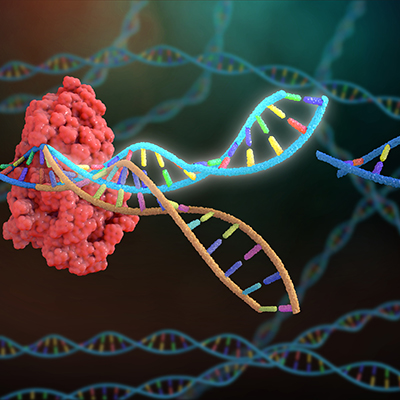November 9, 2022 -- A new CRISPR-based method for studying large-scale genetic changes that frequently happen in cancer has identified deletions that mediate immune evasion and metastasis.
In a study published November 7 in the journal Nature Cancer, Memorial Sloan Kettering Cancer Center researchers describe the creation and use of the Molecular Alteration of Chromosomes with Engineered Tandem Elements (MACHETE). The technique enabled the scientists to slice out significant targeted sections of genetic code and thereby mirror the changes that occur in cancer and other human diseases.
Armed with MACHETE, researchers can study copy number alterations (CNAs), the large-scale genetic changes that can affect dozens of genes simultaneously and frequently happen in cancer. The duplication and deletion of large sections of individual chromosomes are potentially important, with a typical tumor carrying 24 different CNAs that impact up to 30% of its genome on average, but the changes are harder to study than point mutations. High CNA burden is linked to recurrence and poor health outcomes.
The Memorial Sloan Kettering researchers used the CRISPR-based tool to functionally dissect 9p21.3, a chromosome that is the focus of the most prominent homozygous deletions in cancer. The deletions can eliminate CDKN2A/B tumor suppressors, disabling a cell-intrinsic barrier to tumorigenesis, and half also encompass a type I interferon (IFN) gene cluster. Less was known about the effect of the IFN co-deletion.
"It's been hard to study these interferons because they're encoded by a cluster of 16 genes. Using MACHETE revealed a major way in which developing cancer cells avoid being recognized by the immune system, and which can also lead to resistance to immunotherapies aimed at reactivating the immune system to attack the cancer," Scott Lowe, PhD, the study's senior author and chair of the Sloan Kettering Institute's Cancer Biology & Genetics Program, said in a statement.
Applying MACHETE to a syngeneic mouse model of pancreatic cancer, the collaborators showed that the co-deletion of the IFN cluster promotes immune evasion, metastasis, and immunotherapy resistance. The effects reflect the disruption of type I IFN signaling in the tumor microenvironment and its impact on the infiltration of T cells and CD8+ T-cell surveillance. A melanoma model confirmed the findings.
Combined with knowledge of the effect of eliminating CDKN2A/B tumor suppressors, the study shows that the chromosomal co-deletion can disable both cell-intrinsic and cell-extrinsic tumor suppression. In clinical practice, knowledge of a new determinant of responsiveness to immune-checkpoint blockade could lead to type I IFN status being used to inform patient stratification.
Copyright © 2022 scienceboard.net









